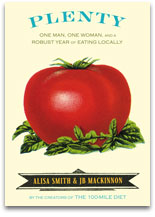
When I caught up with 100-mile dieters Alisa Smith and James MacKinnon a few weeks ago, they were just kicking off their book tour with a stop in Toronto, and I hadn’t even had a chance to read Plenty, in which they recount a year of local eating.
Sure, I had the basic info — one man, one woman, a year of eating only food grown within 100-mile radius of their Vancouver, B.C. home. They’d kept up a blog on their website, 100milediet.org, posted regular dispatches on The Tyee, and we’d even written about them here on Gristmill a bit. While I was intrigued by their experiment, I figured I knew everything I needed to know about their year of eating. What else would the book have to offer?
Well, while the book is in fact a thorough report on what and how to eat local in today’s globalized food system (and even includes some great local recipes), it’s also a whole lot more. There’s plenty of discussion about fruits, vegetables, nuts, and berries and how the pair go about getting them. But the book is more of an exploration of food and our relationship to it, and the pair’s relationship to each other throughout the course of the year.
I guess I should have expected as much from a team of writers, but the depth they go in assessing their diet is pretty astounding. They cover history of the local land and agriculture, as well as analysis of how our food system got to this point. Their history of the region is paired with some personal history, about their own relationship to food and family over the years — which is pretty important when you think about how many of our habits and decisions about food are the direct product of how we were raised. Smith’s chronicling of her grandmother’s and mother’s relationship to food, and her own, reveals a lot about how much things have changed in even the still-living generations, and James also offers insight from his own familial background — broken home, cooking for himself at a young age, that sort of thing.
Their relationship to each other, and to friends, is also affected by the year in ways you might not quite expect. Sometimes potatoes and a long-term partner have something in common — you start to get tired of them. So as the chapters alternate back and forth between Smith and MacKinnon, personal dramas play out (quite literally) over the dinner table. Interesting fare for a book you thought was just about food.
And throughout the experiment, they encounter plenty of colorful local-touting farmers, fishermen, small grocers, and back-to-the-landers, characters who illustrate the possibilities of local food. They’re also brought closer to old friends — and each other — through attempts to make cheese and berry-picking ventures — more color that clarifies that it was never really just about food.
So whether you’re interested in the food part or the personal part, the book offers, well, plenty of insight into their year of local eating. It’s also a good motivator for anyone looking to change their own eating habits in the interest of personal and planetary health.
